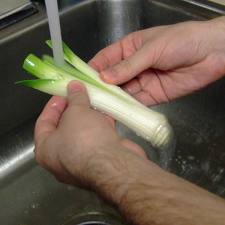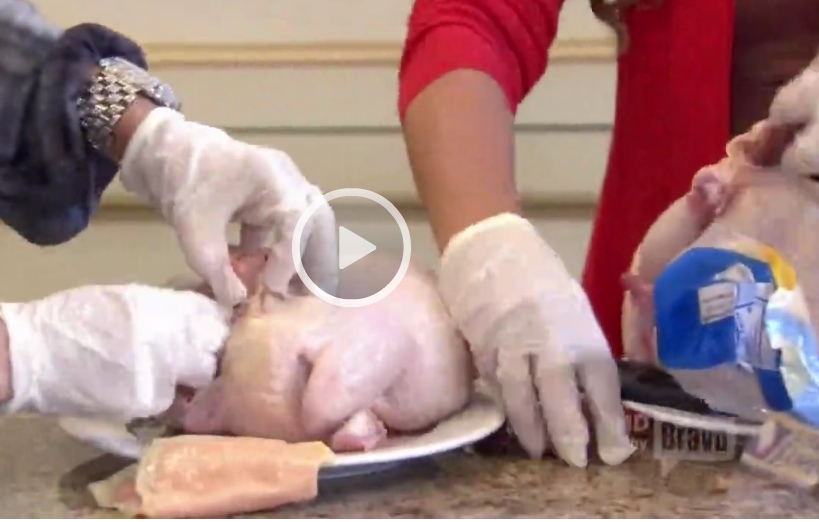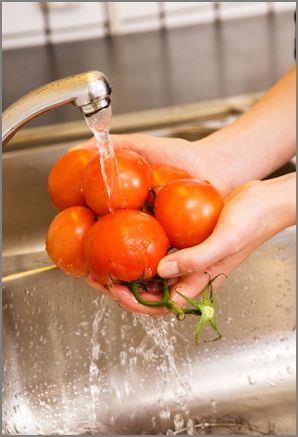Sprouts are not a health food. But there’s lots of other food safety myths. USA Today’s Elizabeth Weise spoke with food safety experts to pull together a list of the most common food safety myths.
* Mayonnaise is a death trap.
Actually, mayonnaise is an ingredient "with penicillin-like properties," says Don Zink, senior science adviser for the Food and Drug Administration’s Center for Food Safety and Applied Nutrition in College Park, Md. Mayo is a homogenized mixture of oil and water, with egg white to stabilize it. The salt and vinegar or lemon juice makes the tiny droplets of water suspended in the .jpg) mixture deadly to microbes. So for a safer salad, don’t hold the mayo. Putting in more mayonnaise only makes it safer, he says. No, not forever, but certainly long enough for a picnic.
mixture deadly to microbes. So for a safer salad, don’t hold the mayo. Putting in more mayonnaise only makes it safer, he says. No, not forever, but certainly long enough for a picnic.
• Pink pork is a no-no.
Not any more. Last year, the U.S. Department of Agriculture revised its decades-old guidelines and now says that pork, and all whole meat cuts, have to get to only 145 degrees internally, not the 160 the agency had previously suggested. That means a pork roast can have a rosy interior, not the dead gray of your mom’s roast. The change comes because despite everything you were ever told, there’s no trichinosis in commercial pigs. The parasitic disease is caused by eating raw or undercooked meat infected with roundworm larvae. It was a problem years ago, but no longer exists in commercially grown pork, according to the National Pork Board in Des Moines.
• You can smell when food’s gone bad.
Microorganisms divide into two main groups, those that cause spoilage and those that cause disease. There’s some overlap, but many bacteria that cause disease don’t cause overt spoilage. "You could have loads of E. coli or salmonella or listeria in a food and it would not appear to be spoiled or have any off-odor or flavor," says the FDA’s Don Zink. The only real way to judge the safety of a food is by what you know about how it was prepared and stored.
• You should wash produce and meat.
This one seems like a no-brainer: Washing makes things cleaner, right? Wrong. People think they can make produce safer by rinsing it under the tap, but that’s a holdover from the days when they carried in vegetables straight from the garden, still dripping with dew, dirt and the occasional slug. Bagged leafy greens don’t need to be washed at all. "Just open the bag and put them in the salad bowl," says the FDA’s Zink. They were already washed in a sanitizing solution at the packing plant and frankly it was probably a lot cleaner than your kitchen.
Micro-organisms actually bond to the surface of the food item. "You are not going to rinse them off, it simply won’t happen, they cannot be washed off," he says.
All washing might do is "remove the snot that some 3-year-old blew onto the food at the grocery store," says the ever-forthright Powell at Kansas State. Washing "lowers the pathogen count a little, but not to safe levels if it’s contaminated."
Even though half the recipes involving meat tell you to rinse it off (especially chicken and turkey), this is unnecessary and actually dangerous, says Elisabeth Hagen, under- secretary for food  safety at the U.S. Department of Agriculture. "Rinsing meat or poultry with water can actually increase your chance of food poisoning by splashing raw juices and any bacteria they might contain onto your sink and counters."
safety at the U.S. Department of Agriculture. "Rinsing meat or poultry with water can actually increase your chance of food poisoning by splashing raw juices and any bacteria they might contain onto your sink and counters."
• If the water touched your hands, they’re clean.
Think a quick rinse of your hands before you handle food is good enough? Nice try. A good hand-washing takes at least 20 seconds, says Doug Powell, a professor of food safety at Kansas State University in Manhattan, Kan., who has written research papers on the topic. The real cleansing is done by the friction and force of rubbing your hands together, along with the soap. The temperature of the water doesn’t really matter, as it takes 160 degrees to kill bacteria, which would be fine except water that hot would also give you third-degree burns. But warm water does make it more likely you’ll spend the necessary 10 seconds scrubbing under vigorously flowing water. And then another 10 seconds of vigorous rubbing with a towel. "The friction rips the microbes off your skin," says Powell. If you really want to go for the gusto, invest in a nail brush. "Because if you had a Number Two and you experienced ‘slippage’ with your toilet paper, that’s where the pathogens go, under your nails."

 contamination – leeks are grown in soil and whatever microorganisms are within the white bits are going to drip on the counter and elsewhere.
contamination – leeks are grown in soil and whatever microorganisms are within the white bits are going to drip on the counter and elsewhere. • use different chopping boards, knives and utensils for raw and ready-to-eat foods, or wash thoroughly in between preparing different foods; and,
• use different chopping boards, knives and utensils for raw and ready-to-eat foods, or wash thoroughly in between preparing different foods; and, gloves to stuff the birds with herbs and stuff.
gloves to stuff the birds with herbs and stuff. We’ve been away from our American television channels and DVR for a few months already, and I’ve had some odd cravings for bad television. So last night I loaded up the season premiere of the Real Housewives of Beverly Hills only to watch some unsanitary behaviour and food safety mistakes.
We’ve been away from our American television channels and DVR for a few months already, and I’ve had some odd cravings for bad television. So last night I loaded up the season premiere of the Real Housewives of Beverly Hills only to watch some unsanitary behaviour and food safety mistakes..jpg) contaminated leaves will spread bacteria to thousands of other leaves during washing and packaging.
contaminated leaves will spread bacteria to thousands of other leaves during washing and packaging.  before. The issue however is not animal welfare, but the food safety atrocity she committed next by washing her turkey in the sink –- this is somebody who has published two cooking books. It has been proven that bacteria can travel up to 3 feet from the sink, highly increasing the risk of cross-contamination.
before. The issue however is not animal welfare, but the food safety atrocity she committed next by washing her turkey in the sink –- this is somebody who has published two cooking books. It has been proven that bacteria can travel up to 3 feet from the sink, highly increasing the risk of cross-contamination. why a consumer had to buy a new plastic container to recycle or compost, or a lead-lined bag to go shopping.
why a consumer had to buy a new plastic container to recycle or compost, or a lead-lined bag to go shopping..jpg) Catherine Paykin, standing by the meat counter at Fairway said,
Catherine Paykin, standing by the meat counter at Fairway said, But it’s definitely not solving the problem … If you happen to be lucky and the cells of the pathogen are not going to be attached to the surface, you may get lucky. If the cells have formed some structure and are strongly attached to the surface, you may not.”
But it’s definitely not solving the problem … If you happen to be lucky and the cells of the pathogen are not going to be attached to the surface, you may get lucky. If the cells have formed some structure and are strongly attached to the surface, you may not.”